
John Franklin Candy was a Canadian actor and comedian who is best known for his work in Hollywood films. Candy first rose to national prominence in the 1970s as a member of the Toronto branch of the Second City and its SCTV sketch comedy series. He rose to international fame in the 1980s with his roles in comedic films such as Stripes, Splash, Brewster's Millions, Planes, Trains and Automobiles, Spaceballs, The Great Outdoors, Uncle Buck, and Cool Runnings. He also appeared in supporting roles in The Blues Brothers, National Lampoon's Vacation, Little Shop of Horrors, and Home Alone, and featured in dramatic roles in Only the Lonely and JFK.
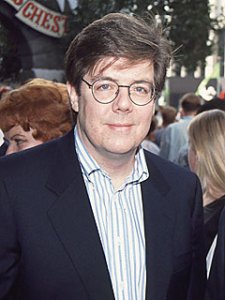
John Wilden Hughes Jr. was an American film director, producer and screenwriter. He began his career in 1970 as an author of humorous essays and stories for the National Lampoon magazine. He went on in Hollywood to write, produce and sometimes direct some of the most successful live-action comedy films of the 1980s. He directed such films as Sixteen Candles, The Breakfast Club, Weird Science, Ferris Bueller's Day Off, Planes, Trains and Automobiles, She's Having a Baby, and Uncle Buck; and wrote the films National Lampoon's Vacation, Mr. Mom, Pretty in Pink, The Great Outdoors, National Lampoon's Christmas Vacation, Home Alone, Dutch, and Beethoven.

Home Alone is a 1990 American Christmas comedy film directed by Chris Columbus and written and produced by John Hughes. The first film in the Home Alone franchise, the film stars Macaulay Culkin, Joe Pesci, Daniel Stern, John Heard, and Catherine O'Hara. Culkin plays Kevin McCallister, a boy who defends his suburban Chicago home from a home invasion by a pair of robbers after his family accidentally leaves him behind on their Christmas vacation to Paris.
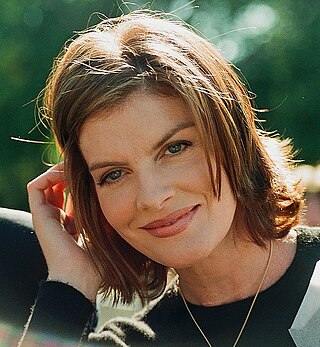
Rene Marie Russo is an American actress and model. She began her career as a fashion model in the 1970s, appearing on magazine covers such as Vogue and Cosmopolitan. She made her film debut in the 1989 comedy Major League, and rose to international prominence in a number of thrillers and action films throughout the 1990s, including Lethal Weapon 3 (1992), In the Line of Fire (1993), Outbreak (1995), Get Shorty (1995), Ransom (1996), Lethal Weapon 4 (1998), and The Thomas Crown Affair (1999).
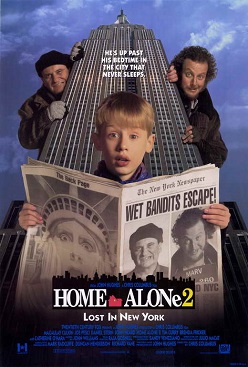
Home Alone 2: Lost in New York is a 1992 American Christmas comedy film directed by Chris Columbus and written and produced by John Hughes. The sequel to the 1990 film Home Alone and the second film in the Home Alone franchise, the film stars Macaulay Culkin, Joe Pesci, Daniel Stern, John Heard, Tim Curry, Brenda Fricker and Catherine O'Hara. It follows Kevin McCallister as he is separated from his family on their holiday vacation to Florida, this time in New York City where he has another encounter with the Wet Bandits after their escape from prison.

Who's Harry Crumb? is a 1989 American comedy-mystery film featuring John Candy as the title character. Paul Flaherty directed the film, which co-stars Annie Potts, Jeffrey Jones and Shawnee Smith. An uncredited cameo appearance is made by Jim Belushi. The story concerns the often incompetent, sometimes brilliant, private investigator Harry Crumb, who searches for a kidnapping victim.

Uncle Buck is a 1989 American comedy film written and directed by John Hughes, and starring John Candy and Amy Madigan with supporting roles done by Jean Louisa Kelly, Laurie Metcalf, Jay Underwood, Macaulay Culkin, Gaby Hoffmann, Elaine Bromka, and Garrett M. Brown. The film tells the story of a bachelor who babysits his brother's rebellious teenage daughter and her younger brother and sister while the parents are away.

Saved! is a 2004 American independent satirical black comedy film directed by Brian Dannelly, and starring Jena Malone, Mandy Moore, Macaulay Culkin, Patrick Fugit, Eva Amurri, Martin Donovan, and Mary-Louise Parker. Its plot follows a teenage girl (Malone) at a Christian high school who has sex with her boyfriend in an attempt to "cure" him of his homosexuality; she becomes pregnant as a result and is ostracized by her schoolmates. Filmed in British Columbia, the film had its theatrical release on May 28, 2004. Saved! was considered a sleeper hit, grossing over $9 million domestically following a platform release through Metro-Goldwyn-Mayer. The film received mixed reviews from critics, with many remarking on its blend of religious satire with elements of the contemporary teen film.
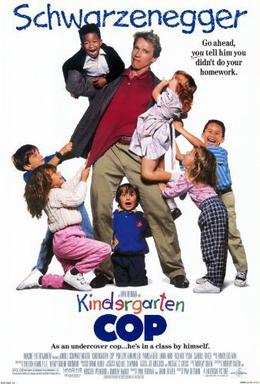
Kindergarten Cop is a 1990 American action comedy film directed by Ivan Reitman and distributed by Universal Pictures. Arnold Schwarzenegger stars as John Kimble, a tough police detective working undercover as a kindergarten teacher to locate the wife and child of drug dealer Cullen Crisp, who are living under assumed identities. Pamela Reed, Penelope Ann Miller and Linda Hunt co-star. The original music score was composed by Randy Edelman. A direct-to-video sequel, Kindergarten Cop 2, was released in 2016.
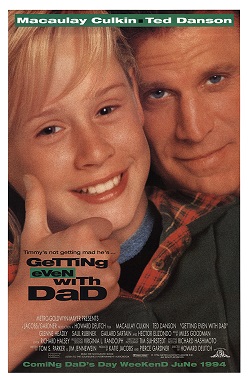
Getting Even with Dad is a 1994 American comedy film starring Macaulay Culkin and Ted Danson.

Continental Divide is a 1981 American romantic comedy-drama film starring John Belushi and Blair Brown. It was the first film to be credited as being produced by Steven Spielberg's production company Amblin Entertainment. It was directed by Michael Apted and written by Lawrence Kasdan.

Message in a Bottle is a 1999 American romantic drama film directed by Luis Mandoki, based on Nicholas Sparks' novel of the same name, and starring Kevin Costner, Robin Wright and Paul Newman. It was filmed in Maine, Chicago and Wilmington, North Carolina. The film follows a writer in love with a shipbuilder after finding a letter inside the bottle. The film was released on February 12, 1999, by Warner Bros. Pictures. It was panned by the critics but was a box office hit, grossing $118 million against a $30 million budget.

The Cider House Rules is a 1999 American drama film directed by Lasse Hallström from a screenplay by John Irving, based on Irving's 1985 novel of the same name. Its story follows Homer Wells, who lives in a World War II–era Maine orphanage run by a doctor who trained him, and his journey after leaving the orphanage. The film stars Tobey Maguire, Charlize Theron, Delroy Lindo, Paul Rudd, Michael Caine, Jane Alexander, Kathy Baker, Kieran Culkin, Heavy D, Kate Nelligan, and Erykah Badu.

Curly Sue is a 1991 American comedy drama film written, produced, and directed by John Hughes, and starring James Belushi, Kelly Lynch and Alisan Porter. It tells the story of a homeless con artist and his young orphan companion who gain shelter with a rich divorce lawyer. This was the final film directed by Hughes before his death in 2009. The film received generally negative reviews from critics.
The Grudge is an American supernatural horror film series released by Sony Pictures based on and a part of the larger Japanese Ju-On franchise. The first installment is a remake of Ju-On: The Grudge and follows a similar storyline to the Japanese film. The sequel, The Grudge 2, is not a remake and follows a unique storyline, albeit still borrowing some plot elements from several Japanese predecessors. Another sequel, The Grudge 3, picks up shortly after the events of the second film.

Looking for Mr. Goodbar is a 1977 American crime drama film, based on Judith Rossner's best-selling 1975 novel of the same name, which was inspired by the 1973 murder of New York City schoolteacher Roseann Quinn. The film was written and directed by Richard Brooks, and stars Diane Keaton, Tuesday Weld, William Atherton, Richard Kiley and Richard Gere.

Legends of Oz: Dorothy's Return is a 2013 animated musical fantasy film that is loosely based on the 1989 book Dorothy of Oz by L. Frank Baum's great-grandson Roger Stanton Baum. It was directed by Daniel St. Pierre and Will Finn. The film stars the voices of Lea Michele, Dan Aykroyd, Jim Belushi, Kelsey Grammer, Hugh Dancy, Megan Hilty, Oliver Platt, Patrick Stewart, Bernadette Peters, and Martin Short.

The War of the Roses is a 1989 American satirical black comedy film based upon the 1981 novel of the same name by Warren Adler. The film follows a wealthy couple with a seemingly perfect marriage. When their marriage begins to fall apart, material possessions become the center of an outrageous and bitter divorce battle.

About Last Night is a 2014 American romantic comedy film starring Kevin Hart, Michael Ealy, Regina Hall and Joy Bryant. It is a remake of the 1986 film of the same name; both films are based on the 1974 David Mamet play Sexual Perversity in Chicago. The remake, featuring a predominantly Black cast, is directed by Steve Pink and written by Leslye Headland. It tells the story of Danny (Ealy) and Debbie (Bryant), and Bernie (Hart) and Joan (Hall), two couples who test how their relationships work in the real world.

The Nutcracker, also known as George Balanchine's The Nutcracker, is a 1993 American Christmas ballet film based on Peter Martins's stage production and directed by Emile Ardolino. It stars Darci Kistler, Damian Woetzel, Kyra Nichols, Bart Robinson Cook, Macaulay Culkin, Jessica Lynn Cohen, Wendy Whelan, Margaret Tracey, Gen Horiuchi, Tom Gold, and the New York City Ballet.


















